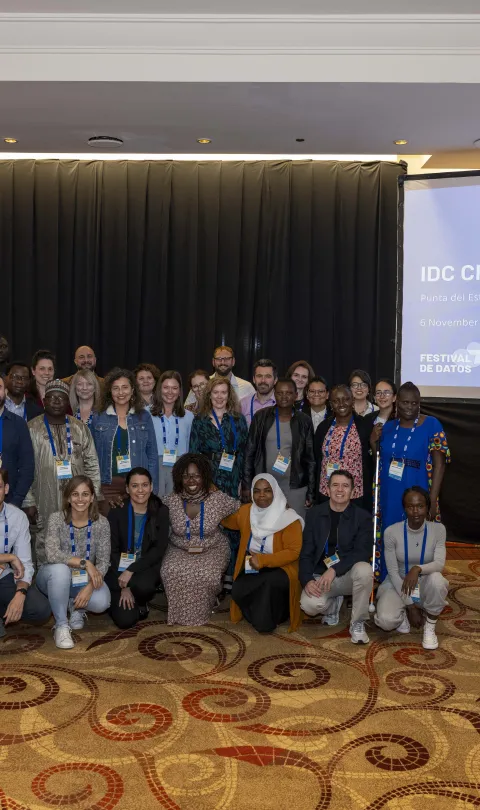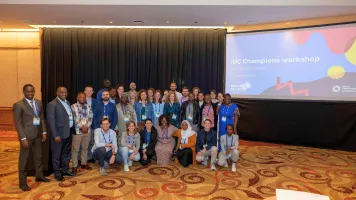In 2018, ten partner organizations launched the Inclusive Data Charter (IDC), a global initiative to mobilize political commitments and meaningful actions to advance inclusive and disaggregated data.
Since then, the IDC network has grown in breadth and diversity from tripling the number of Champions in the network, sparking more dialogue and collaboration on inclusive data issues, to leading critical research efforts, and catalyzing inclusive processes to devise and implement action plans.
Across countries, regions, and local and global levels, the IDC network and Champions have catalyzed change and contributed to increasing visibility and engagement on inclusive data.
2023 was a critical year for the IDC as we marked our five-year milestone, celebrated our impact, and discussed the future of the network. As part of that future outlook, we commissioned a strategic review.
In this review, we asked ourselves two questions: how has the inclusive data landscape evolved in recent years? And how have IDC Champions contributed to that change? Here’s what we found out.

Inclusive data has evolved beyond data disaggregation
The IDC was launched to support governments and organizations grappling with the need for more granular and disaggregated data to monitor progress toward the Sustainable Development Goals (SDGs). While there has been progress in some areas, the 2023 SDG report identified the lack of timely, disaggregated, and comparable data for areas such as climate and gender equality as an area of concern. The work on data disaggregation is far from done yet.
What has evolved in recent years is a recognition that inclusive data is more than disaggregation. Breaking down the data by different characteristics is just one part of the puzzle - how that data is collected, analyzed, and used, who is involved in inclusive data systems and processes, and the measures we take to ensure transparency and accountability throughout the data process are equally important.
Our IDC strategic review found that various trends have impacted how the data community thinks about inclusive data. One of these trends is intersectionality – simply put, how different aspects of a person’s identity, such as gender, age, race, disability, and so on, may overlap to create or reinforce inequalities and exclusion. The IDC network has led pioneering research into defining intersectional approaches to data, which increased interest and sparked new collaborations on the topic.
Other trends that have impacted our understanding of inclusive data include digital inclusion and how in a world of rapidly growing technological advancements, we must not lose sight of the need to ensure equitable and safe access for the benefit of everyone. This was a key topic at the 2023 Festival de Datos held in Uruguay, where AI and technology featured heavily in discussions. It was encouraging to see inclusive data Champions and partners highlighting the need to center inclusion at the heart of these conversations.
A growing interest in citizen-generated data is another trend that has impacted the ways we think about inclusive data. From Senegal to Kenya, the IDC has supported governments in consulting with communities and civil society organizations, building trust and understanding, and co-developing inclusive data action plans. Champions such as CBM Global have also actively promoted the importance of citizen generated data. This is essential to ensuring that people's realities, needs, and ideas are adequately reflected in data. Beyond the IDC, the UN Statistics Division has established a collaborative on citizen data that will guide the advancement of the topic between the statistical community and other organizations engaged in data production and use.
IDC principles have catalyzed institutional change
At the heart of the IDC are five principles that provide the foundation for governments and organizations to collaborate and share knowledge and good practice on strengthening inclusion within their data systems. The IDC’s principles represent a broad pathway that allows different champion organizations to decide what these principles mean in their contexts, enabling them to develop tailored action plans.
The principles are a prompt for stakeholders to think about inclusion, and assess their progress and gaps. One example we saw in the early days of the IDC of how to apply these principles in practice was from Colombia’s national statistics office. The IDC principles helped inspire and inform the establishment of a multi-disciplinary working group, bringing together statisticians, civil society, academia, and others to strengthen the statistical systems’ ability to mainstream Colombia’s intersectional approach to data.
Other Champions have used the principles to embed the IDC within existing structures, systems, and processes, institutionalizing the work within strategic plans. Nigeria has integrated its IDC commitments into the national statistical system to strengthen the inclusion of population groups such as people with disabilities, the elderly, and internally displaced people.
Ghana used their engagement in the IDC to push for legislative changes in their statistics law to include a code of ethics and data quality assurance framework. For other Champions such as UNICEF, Sightsavers and the Internal Displacement Monitoring Centre, establishing organizational working groups bringing together cross-functional teams has enabled them to coordinate better and strengthen the delivery of their work on inclusive data.

Inclusive data remains central to leaving no one behind
Inclusion and the Leave No One Behind (LNOB) agenda are intrinsically linked for many organizations. Our findings from the IDC strategic review found that inclusive data is still seen as central to the LNOB agenda, particularly more so in recent years.
Recognition of the importance of inclusive data has been further amplified due to issues such as COVID-19 and subsequent recovery efforts which highlighted the gaps and need for inclusive data to inform more targeted policies and interventions for groups at most risk of being left behind.
Being part of the IDC has enabled Champions to think about which populations are often left out in their data and data processes, alongside looking at the frameworks needed to advance the LNOB agenda in their contexts. A great example is recent work in Cameroon to localize inclusive data. Training was delivered to build awareness and capacity of local communities, which included local data collectors and representatives of marginalized groups such as people with disabilities. The training focused on LNOB, localizing the SDGs, and inclusive data. The trained representatives subsequently co-led data collection activities within their communities.
One outcome of this work is that people who were being left behind due to limited awareness of their rights under the law have been identified and are now benefiting from access to services. The data generated from these local-level pilots was used as evidence to influence decision-makers, and it has advanced multi-stakeholder collaboration and national-level commitment to the IDC by the ministry responsible for decentralization and local development. The ministry is now looking at how to scale up this localization approach across other councils.
Inclusive data and LNOB go hand in hand. We can’t leave no one behind without inclusive data. However, our strategic review found that there is sometimes a disconnect between the official political language of LNOB and the experiences of the impacted communities in some contexts. An example is those from communities that have historically faced exclusion, such as indigenous people, who are often intentionally marginalized. For them, the conversations around LNOB are often removed from their direct realities and lived experiences.
We must continue efforts to connect the broader discourse on leaving no one behind with the realities of different groups. We must also look beyond the data itself and consider the preconditions necessary for the inclusion and participation of impacted groups.

What’s next for the IDC?
As a network, we have a lot to be proud of. IDC champions have been a key part of the changes in the inclusive data landscape in recent years, advocating others to champion this agenda and actively sharing their knowledge, expertise, and learnings.
Against the backdrop of increasing inequalities worldwide, climate issues, the 2030 SDG agenda lagging behind, and more, we must continue to call for the collection as well as the use of inclusive data, to drive more inclusive and equitable outcomes. The IDC will continue to advocate for inclusive data and grow the breadth and diversity of the network of Champions.
The vision and principles that informed the establishment of the IDC in 2018 remain as relevant as ever. However, we must also be cognizant of the shifts and trends that have informed inclusive data in recent years, such as increased focus on data use, intersectionality, digital inclusion, citizen-generated data and more. In the year ahead, we will update the IDC vision and principles to add more clarity to how the original language should be interpreted, considering developments within the LNOB and inclusive data landscapes.
The IDC bridges the gap between different areas of inclusive data - from gender, disability, and age to intersectionality – we bring together governments and organizations to share their progress, learnings, and foster collaboration to tackle shared challenges and topics of interest. We will continue to foster this collaboration and knowledge sharing. And we will share our insights and learnings with others in the development sector, so we can collectively continue to accelerate action on inclusive data and put people at the heart of data systems.
Download the report on how the inclusive data landscape has evolved and read more about the key insights here.
Find out more about the IDC and how you can get involved.

